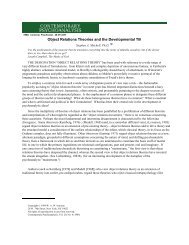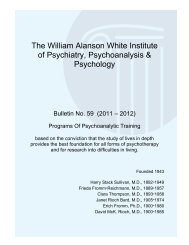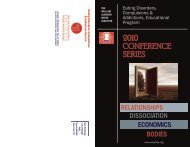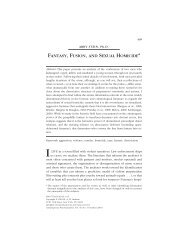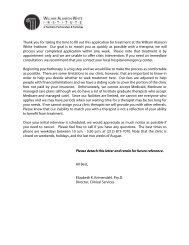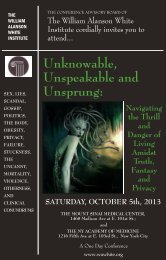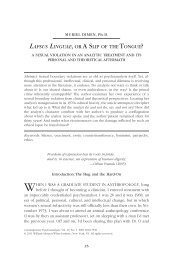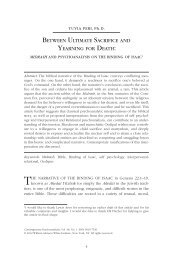Read more. - the William Alanson White Institute
Read more. - the William Alanson White Institute
Read more. - the William Alanson White Institute
Create successful ePaper yourself
Turn your PDF publications into a flip-book with our unique Google optimized e-Paper software.
“Desire, desire, desire . . . ” <strong>the</strong> word itself calls forth its meaning,a complex mix of sound and sense enriched with wishes andlongings, cravings and wants. As a verb “desire” expresses thosedeep seeded emotions as in “I desire you.” As a noun it embodies<strong>the</strong>m, <strong>the</strong> urge and appetite, <strong>the</strong> thirst and need. There’s alsoa higher order to origins of <strong>the</strong> word “desire,” from <strong>the</strong> French “desidere” meaning from <strong>the</strong> stars in <strong>the</strong> sense of awaiting what <strong>the</strong>stars will bring.Desire is a strong feeling, worthy or unworthy, that compelsus to attain or possess something real or imagined. One candesire power, fame and fortune, pleasure, companionship as wellas pain, suffering, and <strong>the</strong> manifestations of unconscious wishesand fantasies. Google “passion and desire” and over 25,000,000hits come up. Google “love and desire,” and you’re in <strong>the</strong> millions.Googling “sex and desire” may crash your computer. For surelove, sex, and passion are integral aspects of desire in <strong>the</strong> waythat streams of a river feed into <strong>the</strong> ocean. Our streams of consciousnessand o<strong>the</strong>r aspects of human nature also have <strong>the</strong>irebb and flow. What desire springs from, it returns to as we do ourorigins of water and dust.In this international symposium—our lucky thirteenth—weturn our analytic lens on <strong>the</strong> subject of desire and try to elucidateaspects of it. Freud considered such questions as “What does awoman want?” “Are we polymorphously perverse?” and “What’slove got to do with it?” (with homage to Tina Turner). So we takeup <strong>the</strong>se timeless issues in today’s world—on and off <strong>the</strong> couch.As we look into <strong>the</strong> psyches of our patients and ourselves, so weare seen in media and popular culture. So we’ll consider that too.We desire to know.Perhaps <strong>the</strong> subject is better left for poets. It’s hard to capturea sense of desire better than Stanley Kunitz in his poem:What makes <strong>the</strong> engine go?Desire, desire, desire.The longing for <strong>the</strong> dancestirs in <strong>the</strong> buried life.One season only,and it's done.But still, let’s try. For we also desire to do our best.



